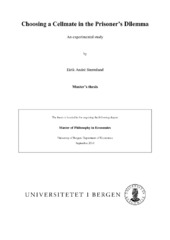Choosing a cellmate in the prisoner's dilemma. An experimental study
Master thesis
Permanent lenke
https://hdl.handle.net/1956/8584Utgivelsesdato
2014-09-01Metadata
Vis full innførselSamlinger
- Department of Economics [287]
Sammendrag
This thesis investigates cooperative behavior in a repeated Prisoner's Dilemma using experimental methods. In the experiment, we allow subjects to form voluntary partnerships by mutual choice, and to communicate through a chat room. Three main research questions were pursued. First, we wanted to show that mutual partner choice could increase cooperation in an environment with a simple matching mechanism. Also, we wanted to study whether there are positive spillover effects between partner choice and communication. Finally, we wanted to replicate a finding than partner choice opportunities induce strategic behavior ( competitive altruism") in humans. Our study makes several novel contributions to the existing literature. We show that mutual partner choice increases cooperation. We find that through partner choice, the game is transformed from a random process to repeated and stable interactions. The competitive altruism hypothesis is supported. We find no effect of partner choice when chat room communication is allowed. We believe communication and partner choice both fail to increase cooperation in the most selfish subjects. Therefore, there is little room for a further effect of partner choice when communication is possible. The experiment was computerized using the experimental software z-Tree 3.3.8. Results were analyzed using the statistical software STATA/IC 13.1 and Microsoft Excel 2010. The Meltzer Fund and the Department of Economics financed the project.
